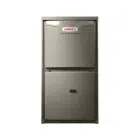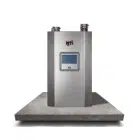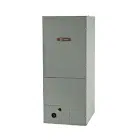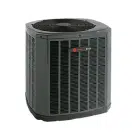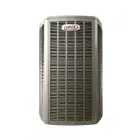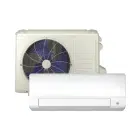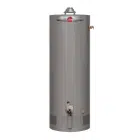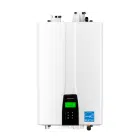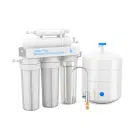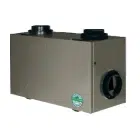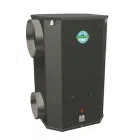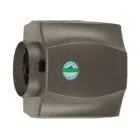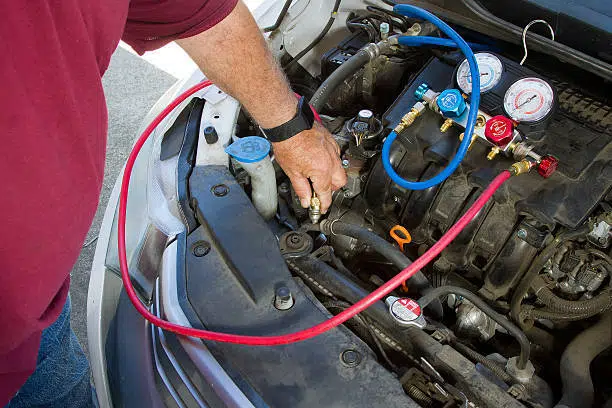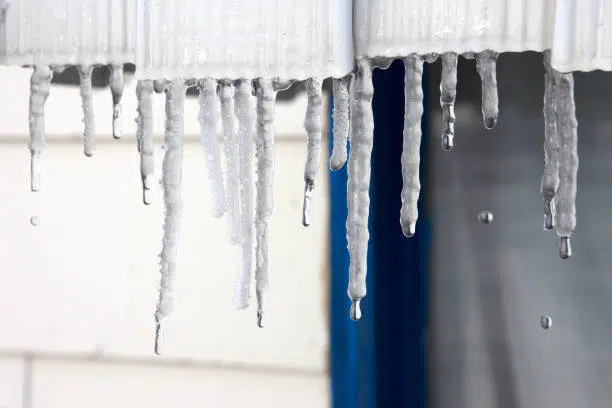
Table of Contents
If you’ve ever noticed ice forming on your air conditioner—especially during summer—you’ve probably asked yourself: “Why is my AC freezing up?” It seems counterintuitive: how can a cooling system freeze in hot weather? The truth is, this is a warning sign that your system isn’t working as it should. In this guide, we’ll break down the most common causes, how to troubleshoot the issue, and what to do to prevent it from happening again.
Poor Airflow: The #1 Cause of a Freezing AC
One of the most common answers to “Why is my AC freezing up?” is poor airflow across the evaporator coil. Your air conditioner needs a steady stream of warm air to keep the coil temperature above freezing. When airflow is restricted, the coil gets too cold, moisture in the air condenses, and then freezes on the coil. This can spiral into a full ice blockage.
Common airflow problems:
- Dirty air filters: Even slightly clogged filters can cut airflow dramatically. Replace them every 1-3 months.
- Blocked return vents: Furniture, rugs, or curtains can accidentally block airflow.
- Failing blower motor: If the blower fan isn’t spinning properly, not enough warm air is pulled in.
- Collapsed or undersized ducts: Poor duct design or damage can restrict airflow without being obvious.
The moment you spot ice buildup, turn off your AC to avoid damaging the compressor. Let it thaw completely, then check your air filter and vents. If airflow seems fine, move on to the next possible cause.
Check out these 5 signs that it’s time to replace your air conditioner in our previous article.
Low Refrigerant Levels and Leaks
Another major answer to “Why is my AC freezing up?” is a refrigerant issue. Your AC system needs a specific pressure level to work correctly. When refrigerant levels drop—usually due to a leak—the pressure inside the evaporator coil also drops. This causes the coil to become colder than normal, eventually leading to ice formation.
Warning signs of low refrigerant:
- Ice on the outdoor refrigerant line
- Warm air blowing from vents
- Hissing or bubbling noises (indicating a leak)
- AC takes longer to cool your space
Topping off refrigerant without fixing the leak won’t solve the problem. In fact, it can worsen the damage over time. A licensed AC repair service should inspect your system with leak detection tools, repair any leaks, and recharge the system to proper specs. This isn’t a DIY fix—AC refrigerants are pressurized and require certified handling.
If you’re still wondering why your AC is freezing up after checking airflow, low refrigerant levels are likely the next culprit.
Thermostat or Fan Malfunctions
A less obvious cause behind the question “Why is my AC freezing up?” is a problem with the system’s internal components—particularly the thermostat or fan motor. These control how often and how long your system runs. If something’s off, your system might run non-stop or not push enough air across the coil, both of which can cause freezing.
Things to check:
- Thermostat stuck in “on” position: The fan runs constantly, even when cooling isn’t needed.
- Fan motor issues: If the motor is failing, airflow drops even if everything else seems normal.
- Dirty coils: If the evaporator coil is covered in grime, it won’t absorb heat efficiently and can freeze over.
If your AC keeps freezing even after airflow and refrigerant levels are ruled out, have an HVAC technician test the thermostat and fan components. Replacing a faulty fan or recalibrating the thermostat could restore proper function quickly.
Outdoor Conditions & Oversized AC Systems
Sometimes the answer to “Why is my AC freezing up?” has less to do with maintenance and more to do with the system design or weather conditions. Running an AC unit when it’s too cold outside (below 60°F) can cause the coils to freeze. Similarly, oversized systems cool your home too quickly and don’t run long enough to dehumidify the air properly, which leads to condensation and freezing.
What to consider:
- Are you running the AC at night in spring or fall? Check outdoor temperatures.
- Is your AC cycling on and off quickly? You may have an oversized unit.
In both cases, the AC isn’t operating under ideal conditions. Avoid using the system when it’s too cold out. If you suspect your AC is too large for your home, an HVAC pro can perform a load calculation and recommend a better-sized unit.
Keep in mind, that these prices can fluctuate based on location, service availability, and the severity of the problem.
What You Should Do If Your AC Is Freezing Up
Now that we’ve answered “Why is my AC freezing up?”, here’s what you should do about it:
- Turn off the system immediately to prevent further ice buildup and damage.
- Allow it to defrost fully—this may take several hours.
- Inspect the air filter and vents. Replace the filter if it’s dirty.
- Check for visible signs of a refrigerant leak or ice on the refrigerant line.
- Call a licensed HVAC technician to perform a full system inspection and repair if the issue isn’t obvious.
Don’t ignore the problem. A freezing AC isn’t just annoying—it can reduce your system’s efficiency, raise your energy bills, and shorten the lifespan of your unit.
So, Don’t Ignore the Ice
As we’ve seen, “Why is my AC freezing up?” isn’t just a casual question—it signals a problem that needs attention. Whether it’s poor airflow, low refrigerant, or a thermostat malfunction, the key is early detection and professional repair. The longer you wait, the more damage you risk doing to your system.
If you’re dealing with a frozen AC and you’re in Canada, reach out to HVAC Service Solutions. Our certified HVAC technicians are trained to diagnose and repair all types of AC issues quickly and efficiently. We’ll help get your system back on track—and keep it from freezing up again.
FAQs
1. Why is my AC freezing up?
The most common reason for an AC freezing up is restricted airflow. This occurs when the system doesn’t get enough warm air to move across the evaporator coils, which causes the refrigerant to cool down too much and freeze condensation. Dirty air filters, blocked vents, or failing blower fans are usually to blame. Low refrigerant levels can also cause the evaporator coils to freeze, as the pressure inside the coils decreases, lowering the temperature. If you’re experiencing a frozen AC, check airflow and refrigerant levels first before calling a professional.
2. How can I prevent my AC from freezing up?
To prevent your AC from freezing, make sure to regularly replace or clean the air filters, as clogged filters are a major cause of poor airflow. Keep vents and return air ducts free of obstructions, and ensure that the blower fan is working correctly. Also, schedule regular HVAC maintenance, including refrigerant checks and coil cleaning. If your system has low refrigerant levels, a professional technician should handle the issue to prevent long-term damage to your unit.
3. Can dirty filters cause my AC to freeze up?
Yes, dirty filters are one of the most common causes of an AC freezing up. When air filters become clogged with dust and debris, airflow is restricted. This means that warm air can’t reach the evaporator coils, causing the refrigerant to get too cold, which results in ice formation. It’s important to change or clean the filters regularly (every 1-3 months) to maintain proper airflow and prevent freezing.
4. What should I do if my AC is freezing up?
If your AC is freezing up, the first thing to do is turn it off to prevent further damage. Allow the ice to thaw completely, which may take several hours. While it’s thawing, check the air filter and make sure the vents and return ducts are unobstructed. If the problem persists, check the refrigerant levels or call an HVAC technician to inspect the system. Don’t ignore a frozen AC, as it could lead to more serious damage if left untreated.
5. Can low refrigerant levels cause my AC to freeze up?
Yes, low refrigerant levels are a common cause of a freezing AC. Refrigerant is responsible for absorbing heat from your home, and when the levels drop, the evaporator coil gets too cold. This can cause moisture in the air to freeze on the coil. Low refrigerant typically indicates a leak in the system, which requires professional attention. Never attempt to recharge the refrigerant yourself; always have a technician handle the refill after locating and repairing any leaks.
6. How can I tell if my AC is low on refrigerant?
Signs that your AC may be low on refrigerant include warm air blowing from the vents, ice forming on the refrigerant line, and the system running longer than usual without cooling the space properly. If you notice any of these symptoms, it’s a good idea to call an HVAC technician to check the refrigerant levels. The technician will be able to locate any leaks, repair them, and recharge the system with the correct amount of refrigerant.
7. Can a malfunctioning thermostat cause my AC to freeze up?
Yes, a malfunctioning thermostat can cause your AC to freeze up. If the thermostat is stuck in the “on” position or isn’t accurately detecting the room temperature, it can cause the system to run too long without cycling off. This extended running time can cause the evaporator coils to become too cold and freeze. If you suspect your thermostat is the problem, check its settings and ensure it’s working properly. A faulty thermostat may need to be replaced by an HVAC professional.
8. What is the role of the blower fan in preventing an AC from freezing?
The blower fan plays a crucial role in preventing an AC from freezing. It helps to circulate air across the evaporator coils, which ensures that the refrigerant inside the coils doesn’t get too cold. If the fan isn’t working properly—due to a malfunctioning motor, dirty fan blades, or a clogged fan—it can reduce airflow, leading to frozen coils. Regular maintenance to clean and check the fan can prevent this issue from occurring.
9. Can outside temperature affect my AC freezing up?
Yes, outside temperature can affect your AC’s ability to function properly. If the temperature outside is too low—below 60°F (15°C)—the AC system can freeze. This is especially common during cooler months or in regions where temperatures drop at night. The compressor is designed to work in a specific temperature range, and running the system when it’s too cold outside can cause it to freeze up. Always check the weather before running your AC in cooler conditions.
10. Is it safe to continue using my AC if it’s freezing up?
It is not safe to continue using your AC if it’s freezing up. Running the AC while it’s frozen can cause serious damage to the compressor and other components, leading to expensive repairs. If you notice ice buildup on your unit, turn it off immediately to prevent further damage. Allow it to thaw and then inspect for airflow issues or refrigerant leaks. If the problem persists, call an HVAC technician to fix the issue and ensure that your AC is safe to use.
Share

